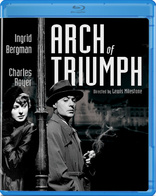Arch of Triumph Blu-ray Movie
HomeArch of Triumph Blu-ray Movie 
Olive Films | 1948 | 135 min | Not rated | Jul 15, 2014Movie rating
6.9 | / 10 |
Blu-ray rating
| Users | 2.5 | |
| Reviewer | 3.0 | |
| Overall | 2.5 |
Overview
Arch of Triumph (1948)
In winter of 1938, Paris is crowded with refugees from the Nazis, who live in the black shadows of night, trying to evade deportation. One such is Dr. Ravic, who practices medicine illegally and stalks his old Nazi enemy Haake with murder in mind. One rainy night, Ravic meets Joan Madou, a kept woman cast adrift by her lover's sudden death. Against Ravic's better judgement, they become involved in a doomed affair; matters come to a crisis on the day war is declared.
Starring: Ingrid Bergman, Charles Boyer (I), Charles Laughton, Louis Calhern, Ruth WarrickDirector: Lewis Milestone
| Romance | Uncertain |
| War | Uncertain |
| Drama | Uncertain |
Specifications
Video
Video codec: MPEG-4 AVC
Video resolution: 1080p
Aspect ratio: 1.37:1
Original aspect ratio: 1.37:1
Audio
English: DTS-HD Master Audio Mono (48kHz, 16-bit)
Subtitles
None
Discs
25GB Blu-ray Disc
Single disc (1 BD)
Playback
Region A (B, C untested)
Review
Rating summary
| Movie | 3.0 | |
| Video | 3.0 | |
| Audio | 3.5 | |
| Extras | 0.0 | |
| Overall | 3.0 |
Arch of Triumph Blu-ray Movie Review
They'll always have Paris.
Reviewed by Jeffrey Kauffman July 24, 2014If Parisian tourguides are to be believed (and many of them are British, so their comments must be taken with a grain or two of Francophobic salt), French insurance companies specifically deny coverage for any of Paris' insanely busy roundabouts, like the one that encircles one of the most famous icons of French history and national pride, the Arc de Triomphe. As someone who madly decided to rent a car in Paris the last time I was there (ostensibly to get to Normandy, but which by default included urban Parisian driving), I can vouch for the fact that you pretty much take your life into your hands anytime you venture into a Parisian roundabout, whether on foot or in a vehicle, and so the fact that insurance companies refuse to cover any accidents in these locations strikes me as completely plausible. There is in fact a little coterie of observers who congregate regularly at the apex of the Champs-Elysées for the very opportunity to witness a fender bender (or several) in the grand parade of traffic that marauds around the Arc de Triomphe. There's a different if no less deadly kind of danger afoot in Lewis Milestone's largely forgotten 1948 opus Arch of Triumph, a film which opens with a stunning view of the monument (plus what looks like a not very convincing miniature), as an instant visual glyph that we're in the City of Lights. It's the last few relatively calm hours before the outbreak of World War II, in a rain soaked winter of 1938, and while true hostilities have not yet broken out between France and Germany, there's little doubt that the bad guys in the film, as personified by a dapper if depraved Charles Laughton in a showy supporting role, are Nazis.
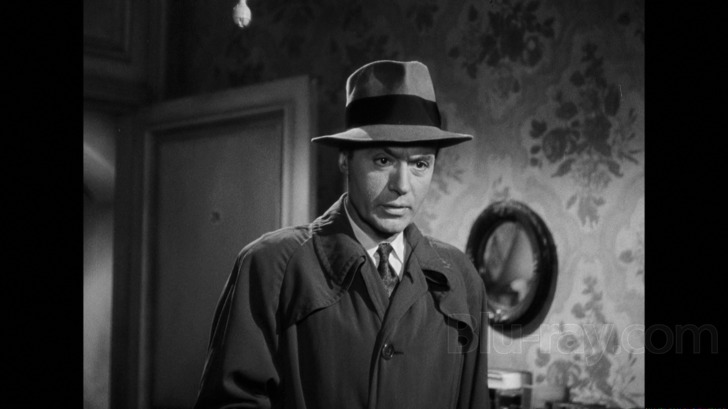
While Arch of Triumph bears literary origins, having been culled from a novel by Erich Maria Remarque which had been a bestselling blockbuster in 1945, it’s more than obvious that the ghost of Casablanca rather uneasily haunts much of this film, and not only because of Ingrid Bergman's participation. (In a side note, it’s instructive to note that director Lewis Milestone cut his career teeth on All Quiet on the Western Front, one of the most famous war films of all time and another film based on a novel by Remarque.) Once again, there are refugees trying to get from Point A to Point B, but being hobbled by an incipient Nazi obstacle course.
The focal refugee is Dr. Ravic (a seriously wan Charles Boyer), a physician who in Remarque’s original was a German émigré now practicing (illegally) in Paris, but who is in the film unavoidably Gallic (in accent and manner if not in actual nationality) due to Boyer’s inherent qualities. Ravic has escaped from being a prisoner of the Nazis, though he still bears both physical and psychological wounds from the situation. The good doctor is haunted by memories of this torture, especially since it ended up killing his wife. The Nazi in charge of the operation was a bully named Von Haake (Charles Laughton), and Ravic is absolutely certain he’s seen the villain traipsing through the rainy streets of Paris. Or—is he hallucinating?
One night while strolling through, yes, the rainy streets of Paris (this is one of the most relentlessly soggy war movies ever) Ravic saves a young woman from what appears to be a suicide attempt. Her name is Joan Madou (Ingrid Bergman), and she is rebounding (none too well, it seems) from another suicide—that of her lover. Ravic brings her back to his flat to help her get her emotional bearings, and soon sets her up as a chanteuse at a local nightclub which is frequented by White Russian glitterati who have had several decades’ practice at being refugees. The doorman there is a former Russian noble named Boris Morosov (Louis Calhern), who is a friend of Ravic’s and who in the film is given most of the weightier philosophical dialogue.
Joan begins to fall rather heavily for Ravic, but Ravic is aware that his status is precarious at best, and he doesn’t want to be leading the obviously emotionally unbalanced woman along into a romance that is probably doomed from the outset. Ravic is also dealing with his own issues, unable to forget or forgive the monstrous behavior of Von Haake. Still, the two take halting steps toward each other, steps which are temporarily waylaid when Ravic’s greatest fear—deportation—actually comes to pass. That sets the film out on its equally baroque second act, where Ravic returns after exile to find Joan living the high life as a kept woman and Von Haake still traipsing around those rainy Parisian streets.
There are a number of things ailing Arch of Triumph, the chief of which is an overstuffed length (the film clocks in at well over two hours, evidently cut down from a four hour rough cut). Remarque’s novel was apparently a very dense affair with tons of characters (many of whom don’t even make it to the film version), but in trying to capture as much of the flavor of the novel as possible, Milestone and his co-writer Harry Brown fail to adequately shape the morass that’s left, offering a kind of sloppy, drawn out doomed romance playing out against the background of a burgeoning global conflict. The best thing about the film is its palpable sense of melancholy. Boyer and Bergman both create completely convincing portraits of wounded souls struggling to survive in a world that makes no sense and a place where neither of them belongs, but too much time is spent on the romantic angle to make what is arguably the film’s real calling card—Ravic’s quest for vengeance against Von Haake—resonate as deeply as it might have otherwise.
It’s no mere coincidence that what is arguably the film’s strongest sequence in fact deals with that very quest for vengeance. It’s an incredibly brutal scene (and just as incredible, evidently what’s in the film pales to what the censors took out), and it suddenly gives voice to all the tamped down melancholy that’s gone before. It’s okay to repeatedly see a misty eyed Ingrid Bergman, but unless Sam is there to sing “As Time Goes By”, it just doesn’t have the same impact.
Arch of Triumph Blu-ray Movie, Video Quality 

Arch of Triumph is presented on Blu-ray courtesy of Olive Films with an AVC encoded 1080p transfer in 1.37:1. Frankly, I could reasonably argue a 3.5 score for this presentation, for when it's good (which is often), it boasts really good contrast and ample black levels, helping the noir-ish photography by Russell Metty to offer surprising depth and nuance. Unfortunately, there are an ungainly amount of clarity, grain and contrast variances here that suggest to me that this was cobbled together from composite elements. There are numerous cutaways and even shorter segments that have noticeably worse contrast (to the point that backgrounds of frames are basically black), with increased fuzziness and pronounced grain. As with many vintage Olive releases, the elements have their fair share of age related damage as well. Still, there's nothing here that's less than watchable, if approached with reasonable expectations.
Arch of Triumph Blu-ray Movie, Audio Quality 
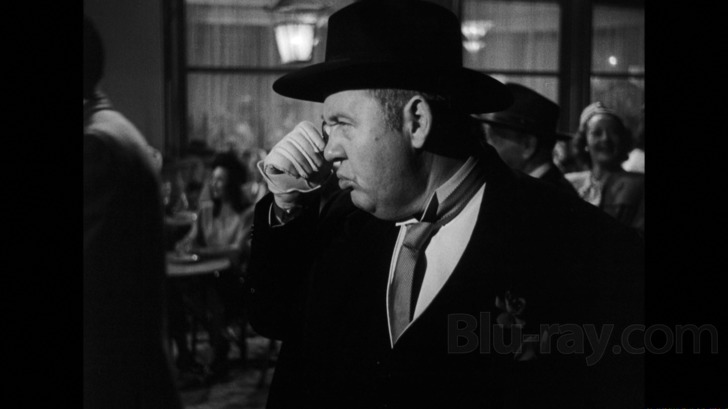
Arch of Triumph's lossless DTS-HD Master Audio Mono track has a lot of high end, with attendant hiss. The high end tends to make the score (including a song Bergman warbles) and a few sound effects just a bit shrill, but dialogue escapes mostly unscathed. The entire track suffers from a certain boxiness, as befits its era, but there are no deal killing problems.
Arch of Triumph Blu-ray Movie, Special Features and Extras 
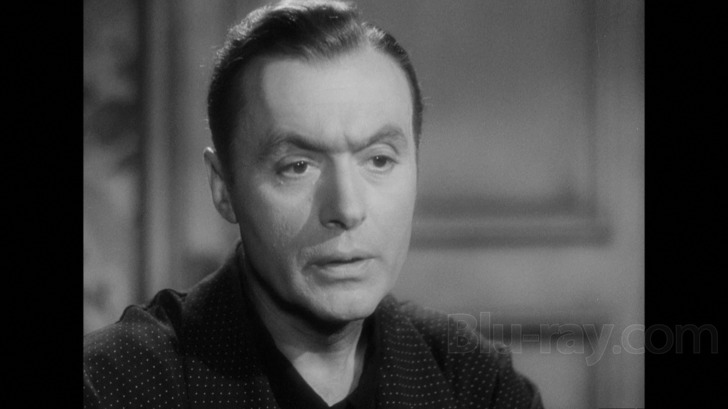
There are no supplements on this Blu-ray disc.
Arch of Triumph Blu-ray Movie, Overall Score and Recommendation 
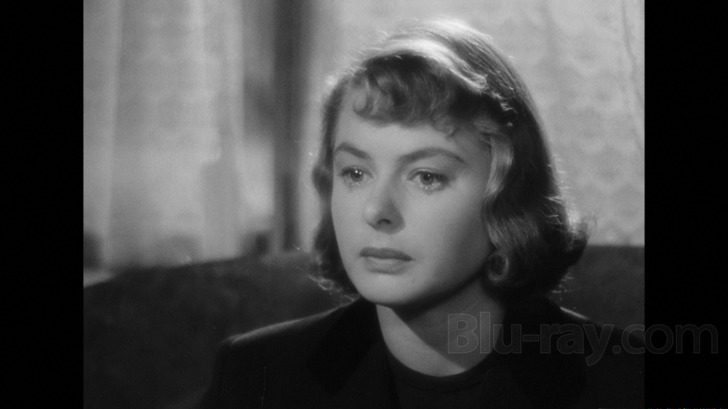
Though the rain is relentless in Arch of Triumph, unfortunately lightning doesn't strike twice, and this World War II refugee romance starring Ingrid Bergman can hardly be placed in the same category as the immortal Casablanca. If the seriously overstuffed second act had been aggressively trimmed, letting the film focus on the revenge angle earlier, Arch of Triumph would at least have been an agreeable enough effort. Still, fans of the stars may want to check this out, but they should be prepared for less than optimal video and (to a less extent) audio.
Similar titles
Similar titles you might also like

Casablanca 4K
80th Anniversary Edition
1942

Wings
1927

The Four Horsemen of the Apocalypse
Warner Archive Collection
1921

Kings Go Forth
1958

Madame Bovary
Warner Archive Collection
1949

Camille
Warner Archive Collection
1936

Cyrano de Bergerac
1950

The Last Time I Saw Paris
Warner Archive Collection
1954

Madame Bovary
2014

The Hunchback of Notre Dame
1939

Testament of Youth
2014

A Farewell to Arms
1957

Bel Ami
2012

Green Dolphin Street
Warner Archive Collection
1947

Hold Back the Dawn
Arrow Academy
1941

A Farewell to Arms
1932

The Heiress
1949

A Tale of Two Cities
Warner Archive Collection
1935

The Razor's Edge
1984

Love and Honor
Love & Honor
2013
